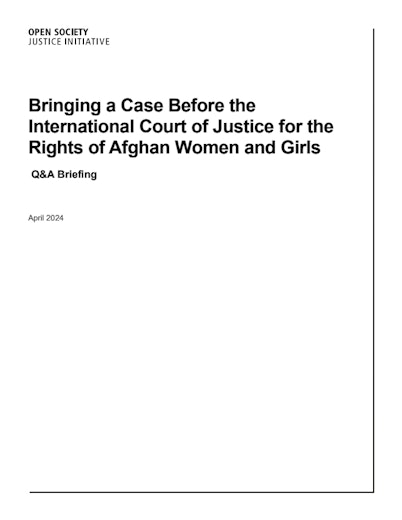Civil Society Groups Urge Egypt to Implement Decision from Africa’s Top Human Rights Body on Torture and Abusive Detention
NEW YORK—Today, the Egyptian Initiative for Personal Rights (EIPR) and the Open Society Justice Initiative sent a letter to the African Commission on Human and Peoples’ Rights to express grave concern about Egypt’s continued non-compliance with the Commission’s groundbreaking decision in El Sharkawi v. Arab Republic of Egypt, made in February. The decision from Africa’s top human rights body had concluded that Egypt’s Emergency Law contravenes the African Charter on Human and Peoples’ Rights and instructed the Egyptian government to reform domestic laws to prevent recurring human rights violations.
In the decision, which concerned a case of torture and prolonged arbitrary detention of a Pakistani national of Egyptian origin, the Commission also instructed the Egyptian government to issue an apology and financial reparations to the victim, Mohammed Abderrahim El-Sharkawi. In their letter to the Commission, the EIPR and the Justice Initiative call on the human rights body to require Egypt to comply with all aspects of the Commission’s decision in this case, and to take further measures, including holding a hearing on the status of implementation.
El Sharkawi v. Arab Republic of Egypt was filed in 2011 by EIPR and the Open Society Justice Initiative on behalf of Sharkawi. After being detained in 1995, Sharkawi was imprisoned for over 15 years under Egypt’s Emergency Law: measures granting broad powers to security forces, including the ability to detain people for any period of time, for virtually any reason. The Commission’s February decision had come amidst increasing international criticism of these decades-old laws, which Egypt continues to use to justify crackdowns on civil society and freedom of expression.
“Even though the events of this case occurred decades ago, it couldn’t be more relevant to today’s Egypt, where arbitrary detention and the mistreatment of detainees remain the norm, and are weaponized as tools of repression,” said Hossam Bahgat, executive director of the EIPR. “When the African Commission on Human and Peoples’ Rights released its decision this year, it sent a powerful rebuke of government impunity. It is an important step in bridging Egypt’s enormous accountability gap on human rights.”
“Egypt cannot continue to justify systematic human rights abuses with the pretext of security,” said Amrit Singh, a lawyer with the Justice Initiative. “While the Egyptian government has sent a message that it is prioritizing human rights reforms—especially as it sets its sights on conditional military aid from the U.S.—President al-Sisi’s continued failure to enact legal changes to comply with the African Charter, as ordered by the Commission, signals a disconnect between rhetoric and practice.”
Throughout his detention by Egyptian authorities, there were 15 court orders for Sharkawi’s release. While in detention, he was electrocuted, beaten with rubber sticks and fists, hung from the ceiling by his wrists and ankles, handcuffed and blindfolded for prolonged periods, and held in inhumane conditions. Although Sharkawi was released in March 2011 following President Hosni Mubarak’s resignation, officials did not provide him with any explanation, apology, compensation, or other redress for the rights violations committed against him.
In its decision on El Sharkawi v. Arab Republic of Egypt, the Commission concluded that Egypt’s prolonged arbitrary detention of Sharkawi, including detaining him incommunicado and subjecting him to detention without charge or trial, torture, and ill-treatment violated numerous provisions of the African Charter on Human and Peoples’ Rights. In addition to requiring the Egyptian government to issue Sharkawi an apology and pay him 1 million Egyptian pounds ($140,000 at the time of filing), as well as to enact reforms to prevent future abuses, it also instructed the government initiate a commission of inquiry and report back to the Commission on its implementation.
The Commission also held that Egypt’s Emergency Law “does not conform to the African Charter and fails to fully respect the rights of arrested and detained persons.” Significantly, the Commission agreed with the observation of the former UN Special Rapporteur on Counterterrorism that “[a] state of emergency almost continuously in force for more than 50 years in Egypt is not a state of exceptionality; it has become the norm, which must never be the purpose of a state of emergency.”
Under the current regime of President Abdel Fattah Al-Sisi, Egypt is experiencing one of its worst human rights crises in decades: expanded “emergency” measures, terrorism charges used to persecute dissidents, journalists, and human rights defenders with impunity, the rampant use of torture, arbitrary detention, and enforced disappearances. Human rights groups have documented the arrest of tens of thousands of human rights defenders, journalists, and activists under the Emergency Law without due process. Last March, 31 countries—including the United States—issued a joint statement on human rights in Egypt, calling on the government to end its prosecution of journalists, activists, and perceived political opponents.
Related Cases
Related Work
Q&A: Bringing a Case Before the International Court of Justice for the Rights of Afghan Women and Girls
This paper considers 21 questions around the feasibility of bringing a complaint at the International Court of Justice against Afghanistan's Taliban for egregious and prevalent violations of women’s and girls’ rights.

A Podcast Gives Voice to Syrians Searching for Justice in Europe International Justice
Now in its second series, “The Syria Trials” tells the human stories behind the drive to prosecute al-Assad regime officials for atrocity crimes before European courts.

Immunities and a Special Tribunal for the Crime of Aggression against Ukraine
This briefing paper provides a non-exhaustive overview of the application of immunities to prosecutions for the crime of aggression, particularly to the Russian head of state, head of government, and minister of foreign affairs, before a Special Tribunal for the Crime of Aggression against Ukraine.
